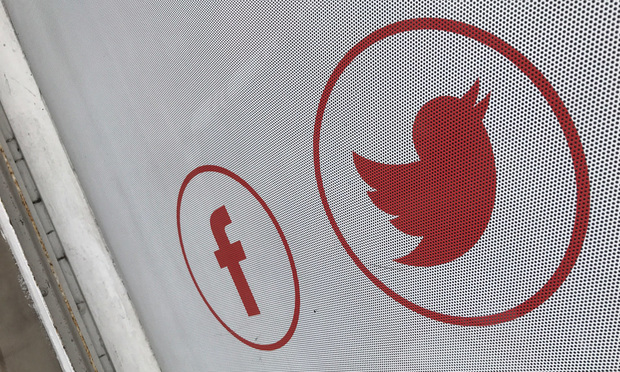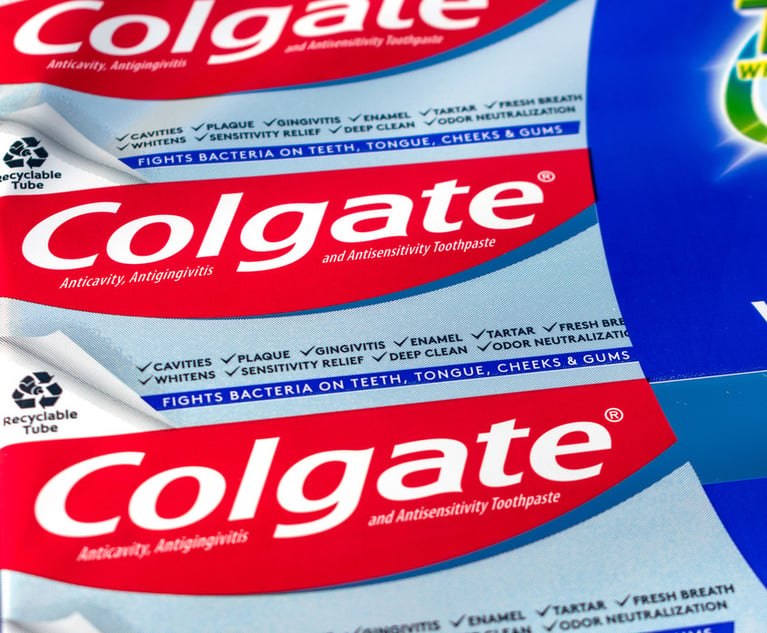Strange Bedfellows? Facebook, Twitter Get Kudos From Feds in Midterm Interference Investigation
In announcing criminal charges against a Russian national for partaking in a conspiracy to disrupt elections in the U.S. and abroad, the DOJ cited Facebook and Twitter for their "exceptional cooperation."
October 22, 2018 at 02:36 PM
4 minute read
 Credit: Mike Scarcella / ALM
Credit: Mike Scarcella / ALM
In announcing the criminal charges of a Russian national for alleged midterm election conspiring, Department of Justice officials explicitly thanked a pair of significant, if somewhat unusual, cooperators: Facebook and Twitter.
“The investigative team received exceptional cooperation from private sector companies, such as Facebook and Twitter,” read the DOJ's announcement. The DOJ statement came alongside the unsealing of a complaint that alleges that defendant Elena Alekseevna Khusyaynova conspired to tilt the U.S. midterms and other elections by purchasing advertisements and creating posts and groups on social media outlets like Twitter, Facebook and Instagram.
Recent scandals involving social media's role in election interference may be changing technology companies' hardline approach to government requests for user information. Former DOJ trial attorney Peter Henning said in a typical government investigation, social media companies would “demand a subpoena or a search warrant. Though because this is Russia interference, I don't think they don't have the same privacy concerns.”
“They're trying to mend their ways, or at least to rebuild their reputation,” explained Henning, now a law professor at Wayne State University. “Because it's Russian interference, they're not worried about privacy, that has definitely taken a backseat.”
But the reputation benefits don't just go one way. The DOJ's “shout-out,” Henning noted, is a way to demonstrate to other regulators that they can “play ball” with social media companies. Russia is “a very different beast” than situations like providing assistance in unlocking the San Bernardino shooter's iPhone.
“'I want to protect Russia trolls' is not a battle cry,” Henning said.
The DOJ's complaint doesn't reveal the companies' roles in the investigation efforts. Facebook for its part told The Recorder in a statement that “combatting election interference is a task that requires cooperation from government and private industry.” Twitter, meanwhile, noted that it didn't “have anything to share” regarding its role.
Theresa Payton, former CIO for the White House under George W. Bush, said that when the DOJ mentions exceptional cooperation “it typically indicates that the companies went above and beyond what's required.”
“This could mean that they not only supplied information and intelligence but possibly also experts and inside operations that would assist DOJ with understanding any conclusions their internal teams have reached,” she said. “I see this as a positive step to a more collaborative relationship between the two stakeholders to combat this issue.”
Eric Goldman, co-director of Santa Clara Law's High Tech Law Institute, took a sober view as to whether this sort of give-and-take will change the dynamic between the government and big tech. He noted that it “seems funny” a “social media company would work with the government” given tech companies view federal interference “as an assault on their services.” On the other hand, he said that “much of the government's bashing of internet companies” is about the “much deeper struggle” over user privacy.
“No doubt that the internet companies are motivated to fight the Russian trolls. So when the government comes calling, seeking help on that issue, the internet companies are going to provide greater than normal support for that effort,” Goldman said. And the collaboration, he added, not only pushes the companies to do more, but helps “tell D.C. they can be our friends and not our enemies.”
Social media companies have taken steps in recent months to repair their image after a series of snafus over data privacy protection and allowing election tampering have tarnished their images with the general public. Facebook hired former DOJ prosecutor Nathaniel Gleicher in January to track down trolls trying to rile up political passions and nation-state-led disinformation campaigns. Twitter for its part has banned conservative commentator Alex Jones from its services for posting content that violated the company's abusive behavior policy.
This content has been archived. It is available through our partners, LexisNexis® and Bloomberg Law.
To view this content, please continue to their sites.
Not a Lexis Subscriber?
Subscribe Now
Not a Bloomberg Law Subscriber?
Subscribe Now
NOT FOR REPRINT
© 2025 ALM Global, LLC, All Rights Reserved. Request academic re-use from www.copyright.com. All other uses, submit a request to [email protected]. For more information visit Asset & Logo Licensing.
You Might Like
View All

Colgate Faces Class Actions Over ‘Deceptive Marketing’ of Children’s Toothpaste

'A Death Sentence for TikTok'?: Litigators and Experts Weigh Impact of Potential Ban on Creators and Data Privacy
Trending Stories
- 1How We Won It: Latham Secures Back-to-Back ITC Patent Wins for California Companies
- 2Meta agrees to pay $25 million to settle lawsuit from Trump after Jan. 6 suspension
- 3Stevens & Lee Hires Ex-Middle District of Pennsylvania U.S. Attorney as White-Collar Co-Chair
- 4Alameda Judge Ursula Jones Dickson Chosen as District Attorney
- 5'A Long 6 Years': No $150M for Goldman Sachs Investors
Who Got The Work
J. Brugh Lower of Gibbons has entered an appearance for industrial equipment supplier Devco Corporation in a pending trademark infringement lawsuit. The suit, accusing the defendant of selling knock-off Graco products, was filed Dec. 18 in New Jersey District Court by Rivkin Radler on behalf of Graco Inc. and Graco Minnesota. The case, assigned to U.S. District Judge Zahid N. Quraishi, is 3:24-cv-11294, Graco Inc. et al v. Devco Corporation.
Who Got The Work
Rebecca Maller-Stein and Kent A. Yalowitz of Arnold & Porter Kaye Scholer have entered their appearances for Hanaco Venture Capital and its executives, Lior Prosor and David Frankel, in a pending securities lawsuit. The action, filed on Dec. 24 in New York Southern District Court by Zell, Aron & Co. on behalf of Goldeneye Advisors, accuses the defendants of negligently and fraudulently managing the plaintiff's $1 million investment. The case, assigned to U.S. District Judge Vernon S. Broderick, is 1:24-cv-09918, Goldeneye Advisors, LLC v. Hanaco Venture Capital, Ltd. et al.
Who Got The Work
Attorneys from A&O Shearman has stepped in as defense counsel for Toronto-Dominion Bank and other defendants in a pending securities class action. The suit, filed Dec. 11 in New York Southern District Court by Bleichmar Fonti & Auld, accuses the defendants of concealing the bank's 'pervasive' deficiencies in regards to its compliance with the Bank Secrecy Act and the quality of its anti-money laundering controls. The case, assigned to U.S. District Judge Arun Subramanian, is 1:24-cv-09445, Gonzalez v. The Toronto-Dominion Bank et al.
Who Got The Work
Crown Castle International, a Pennsylvania company providing shared communications infrastructure, has turned to Luke D. Wolf of Gordon Rees Scully Mansukhani to fend off a pending breach-of-contract lawsuit. The court action, filed Nov. 25 in Michigan Eastern District Court by Hooper Hathaway PC on behalf of The Town Residences LLC, accuses Crown Castle of failing to transfer approximately $30,000 in utility payments from T-Mobile in breach of a roof-top lease and assignment agreement. The case, assigned to U.S. District Judge Susan K. Declercq, is 2:24-cv-13131, The Town Residences LLC v. T-Mobile US, Inc. et al.
Who Got The Work
Wilfred P. Coronato and Daniel M. Schwartz of McCarter & English have stepped in as defense counsel to Electrolux Home Products Inc. in a pending product liability lawsuit. The court action, filed Nov. 26 in New York Eastern District Court by Poulos Lopiccolo PC and Nagel Rice LLP on behalf of David Stern, alleges that the defendant's refrigerators’ drawers and shelving repeatedly break and fall apart within months after purchase. The case, assigned to U.S. District Judge Joan M. Azrack, is 2:24-cv-08204, Stern v. Electrolux Home Products, Inc.
Featured Firms
Law Offices of Gary Martin Hays & Associates, P.C.
(470) 294-1674
Law Offices of Mark E. Salomone
(857) 444-6468
Smith & Hassler
(713) 739-1250







